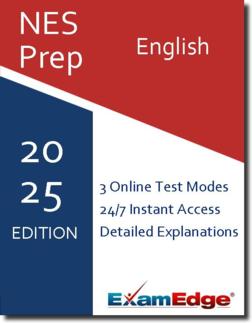NES English (301) Practice Tests & Test Prep by Exam Edge - Topics
Based on 20 Reviews
- Real Exam Simulation: Timed questions and matching content build comfort for your NES English test day.
- Instant, 24/7 Access: Web-based NES English Language Arts practice exams with no software needed.
- Clear Explanations: Step-by-step answers and explanations for your NES exam to strengthen understanding.
- Boosted Confidence: Reduces anxiety and improves test-taking skills to ace your NES English Language Arts (301).

Understanding the exact breakdown of the NES English Language Arts test will help you know what to expect and how to most effectively prepare. The NES English Language Arts has 150 multiple-choice questions The exam will be broken down into the sections below:
| NES English Language Arts Exam Blueprint | ||
|---|---|---|
| Domain Name | % | Number of Questions |
| Vocabulary, Reading Comprehension, and Reading Various Text Forms | 23% | 35 |
| Analyzing and Interpreting Literature | 23% | 35 |
| English Language Conventions, Composition, Writing Process, and Research | 19% | 29 |
| Modes of Writing | 23% | 35 |
| Oral and Visual Communication | 12% | 18 |


